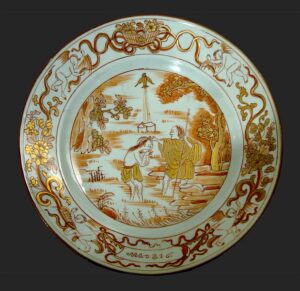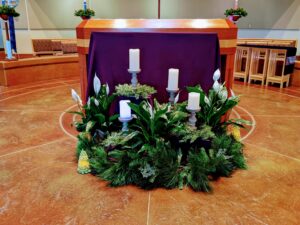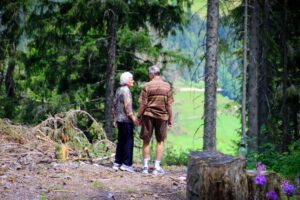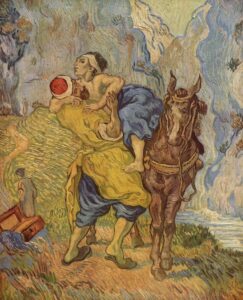A Voice Calls to You – Do you hear?
 Have you ever received a phone call, a text, or a letter inviting you to an event or an activity that you would never have considered attending? It might even be an invitation to something that you didn’t know existed, something so totally out of character for you that you are surprised anyone would ever associate you with that!
Have you ever received a phone call, a text, or a letter inviting you to an event or an activity that you would never have considered attending? It might even be an invitation to something that you didn’t know existed, something so totally out of character for you that you are surprised anyone would ever associate you with that!
My initial reaction in these moments is to decline. “No, I can’t possibly do that.” “I don’t have time.” Usually I don’t say, “Are you crazy? Why would you think I would ever be associated with something like that?” I may be thinking that, but I try to be polite as my mother taught me.
Nevertheless, there have been times when I didn’t say no to the invitation. Invariably, I have learned something important in the process.
I was never into rock and much of the contemporary music of my day as a teen and young adult. As a result, the thought of attending a Grateful Dead concert never entered my mind. Yet as an adult in the late 70s and early 80s, I was working with a group, the Seva Foundation, that was trying to combat preventable blindness in Nepal. (I discovered I was not good at fundraising in the process, but that’s another story.)
One of the folks with whom I was working knew someone from the Grateful Dead and was able to instigate the planning of a benefit concert that included some members of the Dead, along with many other folk and rock artists who were well-known musicians and activists. We were invited to attend as well.
That night, as we stood in line at the will-call ticket booth, a young woman ahead of us, clearly rather “spaced-out,” approached the booth. She went up to the window and warmly greeted Jahanara, who was handing out the tickets. Jahanara smiled and greeted her in return. It was clear the young woman was not there to pick up tickets, but it didn’t matter to Jahanara. There was a warm smile and a wish for a happy evening. Then the young woman walked away peacefully.
I have often reflected on that encounter. I don’t know that I would have had the grace that Jahanara exhibited that night. I might instead have been irritated that the young woman had wasted my time and that of the folks in line. But I think Jahanara’s response was the way Jesus would have responded. I have never forgotten that moment of grace.
Liturgically, we are in a time of hearing about the events in Jesus’ life that led to its climax with his passion, death, and resurrection. We have heard about John the Baptist’s testimony. Today we hear about what happened after John had been arrested by Herod but before his execution. (Mt 4:12-23) Jesus moved from Nazareth to Capernaum and began his journey of preaching: “Repent, the kingdom of God is at hand.”
Capernaum is on the shore of the Sea of Galilee. It’s a very big lake and many folks made their living as fishermen. As he walked along the lake, he saw Andrew and Simon throwing their nets into the lake. He called to them, “Come after me, and I will make you fishers of men.” That seems a crazy thing to say and they responded in an even crazier way. They left their nets right there and walked on with him. Then they saw two other brothers, James and John, in the boat with their father Zebedee. Jesus called them as well. They left their father and went off with him.
These were absolutely outrageous things to do. Totally irresponsible and unheard of. Yet because they heard the invitation and responded, they became witnesses to the greatest event of salvation history – the reconciliation of humanity with God.
Most of the time our own encounters with strangers don’t seem to have cosmic implications. Most of the people we meet on the street or in the grocery store are pretty ordinary folks, with ordinary lives and hopes. But I think we make a great mistake if we assume that because they seem ordinary, there is nothing special about them. Each of us is here for a reason. We mostly have no clue what that reason is, but God has a reason for each of us to be here. There is someone we are to greet. Someone with whom we are to share a smile. Someone who just needs to be seen by another person and treasured as one of God’s special ones.
When Jesus comes into our lives, it’s not generally going to be with trumpet blasts and fanfare. Very likely it will come in the form of an invitation to do or try something that we would not ordinarily do. Who would ever have thought the I would go to a concert and enjoy the music of the Grateful Dead? But I did and it was a wonderful experience. And in the process, I saw the Lord reaching out in kindness to a young woman who needed to hear a gentle word that night.
Jesus continues to walk among us, mostly unseen. He is present in each one of us and wants us to reach out to each other and to those we meet, sharing the great love the Father has for each of his children. We too are called to leave our ordinary “nets” and follow along with him. He will make us fishers of men, women, and children too.
A voice is calling. Do you hear him?
Readings for the Third Sunday in Ordinary Time
Read More




























